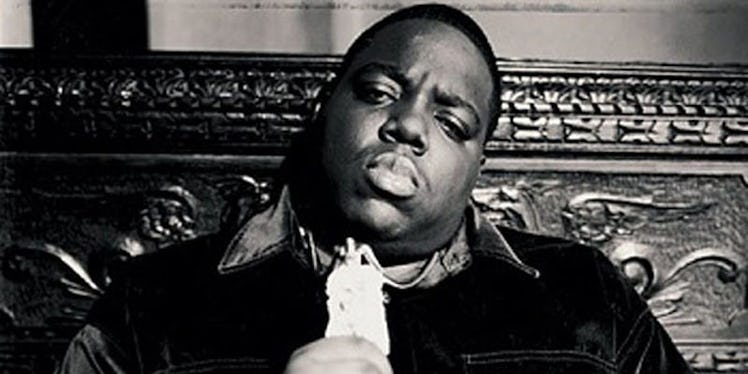
Why I'm Saying Thank You To Biggie Smalls, 20 Years After His Death
Today, March 9, marks the 20-year anniversary of the death of Biggie Smalls.
Exactly 20 years ago, I was skateboarding at the triangle on 168th St. and Broadway when my (then) girlfriend paged me.
I thought: “Who is this?”
My girl's family had just moved from Washington Heights to the Bronx, and I was still getting used to the new 718 number flashing across my beeper.
I skated over to the pay phone by the subway to call her.
She answered, “Baby. Biggie's dead. They killed him in LA last night.”
I was obviously shocked and disappointed, but the entire experience was surreal. At 18 years old, we understand tragic death better than we do at 8, though not nearly as well as we do at 38.
Biggie was older than me, with a figurative presence as big and commanding as his literal one. He represented what a grown man was to my friends and I.
Now I think of Biggie as having been a baby, a mere 25, which in the modern day would barely even qualify him as a millennial.
He was gone. They killed our John Lennon.
Everyone tends to reminisce over the shock of his passing, just as they do when they talk about the first time we heard his music. Depending on how “down” you were determined what track was the first time BIG's words blessed your ears and soul.
For the coolest of the cool, the downest of the down, the natives of Bed-Stuy when it was still “Do or Die,” it was watching him battle on street corners, alternating between freestyle raps and hustling on a corner. Today, that same corner is filled with transplant hipsters who are there to get their $5 cold brews and funky craft micro-brews.
The lames (non-hip-hop-heads) probably first heard him on the "Juicy" video on MTV, and to this day think that was his best song when the rest of us hold it as pretty much dead last.
For the “true heads” who fell somewhere in the middle, it was either the classic "Party and Bullshit" or the more commercial, "Big Poppa," where as soon as we heard that charming, breathy voice the music stopped, no pun intended.
If you were one of the many who “got it,” Biggie's sound on the mic held a presence unlike any before him. Deep and bellowing with the perfect touch of throaty, it was just enough to remind the listener this was hardcore rap, not the old soul music he would have undoubtedly shone in, had he existed in a different time.
Never before had I heard every word and line blend into the next so seamlessly, so fluidly that it became impossible to tell where one ended and the next began, and nobody cared to figure it out.
It didn't matter. We were mesmerized and enthralled, in love with the livest one from Stuyvesant, representin' BK to the fullest.
Biggie taught me that irreverent vulgarity wasn't mutually exclusive to brilliance, and that street credibility could coincide with cleverness and a sharp wit. He was the best of all worlds, appropriately packed into this one massive being who changed the way the world saw rap, who changed the way that I saw myself.
Maybe it was my age, maybe it was the era, but it seemed as if intelligence hadn't yet become as coveted of a social pretense as it is today. Biggie either benefited from this or contributed to engendering it.
He didn't use an abundance of big words with tons of syllables, and didn't care to preach about political, religious or social issues.
It's not that there was anything wrong with conscious hip hop, but there was something about BIG's apparently organic indifference to it, coupled with his frank charm and innate power. This made everything about him so magnetic to us non-PC New Yorkers.
Biggie didn't just just tell his enemies he'd kill them, but practically sang to them in rap prose, “There's gonna be a lot of slow singin' and flower bringin' if my burglar alarm starts ringin'.”
To those who accused him of rapping only about “money and bitches,” I recommend "Everyday Struggle," "You're Nobody" or "Suicidal Thoughts." Biggie's inner turmoil expressed through topical darkness was exceptional to most rappers before him, but closer to the rule for the generation that celebrated him.
While on the surface he may have been compared to peers like Tupac and Jay-Z, those who paid closer attention could see that he was more similar to Kurt Cobain or even R.E.M.
He was obviously consumed by the depravity of existence and his microcosm of the hood served as its perfect metaphor.
Unfortunately prophetic, he did inform us on his first album that he was Ready to Die, and finally left us with the posthumous gift in the form of a double album, Life After Death.
Almost immediately after Biggie left us hip hop changed, which is the diplomatic way of saying that hip-hop died along with him.
The following year brought a not-so-subtle changing of the guard, which is to say it brought a change in the sound, and for better or worse, hip-hop would never be the same again.
Bad Boy gave rise instead to the softer sounds of Puffy and Mase, soon answered by the choppier gruffness of DMX. Production got cheaper, objectively speaking, as samples that cost royalties became a thing of the past almost overnight, and the south rose in popularity.
Suddenly everyone from below the Mason-Dixon Line were becoming instant millionaires for rapping about bitches and money, except most were leagues below the god who did it first.
Thank you, BIG. We loved you and miss you more every year.